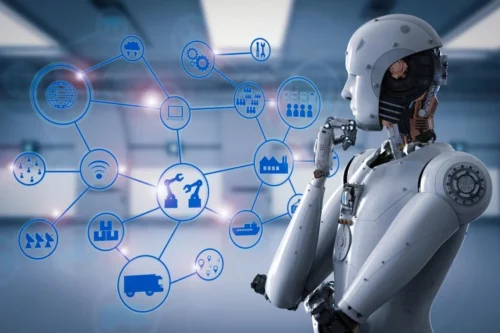The Fourth Industrial Revolution(41R) is a transformative era characterized by technological convergence bridging the gap between the digital, physical, and biological worlds. This revolution, driven by rapid technological advancements such as artificial intelligence (AI), Internet of Things (IoT), robotics, 3D printing, and cloud computing, is reshaping global economies and societies. Many developed nations are at the forefront of this unique transformation and are harnessing the power of 4IR technologies to accelerate economic growth. For emerging economies like Africa, embracing 4IR technologies offers a unique opportunity to accelerate development and bridge the gap with advanced economies.
Understanding the 4IR
The revolution encompasses several key technologies, including AI, the brain behind intelligent systems; IoT, which connects physical devices to the internet; blockchain, which ensures secure and transparent transactions; and robotics, which automates tasks and increases efficiency. Other key technologies include Big Data analytics, cloud computing, augmented reality, and virtual reality. These technologies interact and complement each other, creating a complex ecosystem that drives innovation and transformation.
While AI is one of the critical technologies in the 4IR, it also serves as a foundational element that enhances the capabilities of the other 4IR technologies. For instance, combining AI and IoT creates intelligent systems that can analyze vast amounts of data from connected devices to optimize processes and make informed decisions. This synergy is particularly evident in smart cities, where AI-powered systems efficiently manage traffic, energy consumption, and public services. Furthermore, AI enhances the security and efficiency of blockchain technology by detecting anomalies and optimizing transaction processing. Integrating AI with robotics leads to developing autonomous systems capable of performing complex tasks with precision and adaptability.
Globally, the adoption of 4IR technologies is accelerating at an unprecedented pace. Developed nations are in charge of investing in research and development. These countries have established robust digital infrastructures, fostering a conducive environment for technological advancements. In contrast, Africa faces significant challenges in 4IR adoption. While there is growing interest and potential, the continent needs to catch up in infrastructure, digital literacy, and access to technology.
Challenges of 4IR Adoption in Africa
The 4IR builds on the 3IR (characterized by electronics and information technology) as seen in other advanced countries building on previously established frameworks. Conversely, Africa’s journey from the Third Industrial Revolution (3IR) to the Fourth Industrial Revolution (4IR) has been unclear and uneven, creating a significant technological gap. While advanced economies have seamlessly transitioned into 4IR, many African countries are still operating on 3IR technologies, lagging in substantial technological advancements.
Another primary barrier to 4IR adoption in Africa is robust infrastructure. Many regions suffer from limited or unreliable internet access, with a World Bank report revealing that as of 2022, only 36% of Africa’s population had broadband internet access. Inconsistent power supply also affects the operation of digital devices and automated systems. It is reported that about 600 million Africans still lack access to electricity. This has, in turn, caused a lag in technological advancements since electricity is a crucial ingredient in development.
Additionally, a shortage of skilled professionals in AI, robotics, and other 4IR fields poses a significant challenge. The education system in many African countries has not kept pace with rapid technological advancements. A joint report by UN, ILO, UNESCO, and AU reveals that fewer than 25% of higher education students pursue STEM-related courses, which are vital in promoting tech skills. This, in turn, results in a workforce that lacks the skills needed to leverage 4IR technologies.
Economic constraints, such as limited funding for research and development, and policy barriers, including outdated regulations and lack of government support, further impede the adoption of 4IR technologies in Africa. Social and cultural factors also play a role, with resistance to change and skepticism towards new technologies prevalent in some regions. Bridging the digital divide requires technological solutions, cultural shifts, and greater awareness.
Collective Intelligence for 4IR Tech Adoption
AI could be the most transformative force in Africa’s journey towards the 4IR. But given the continent’s challenges with previous industrial revolutions and the uneven distribution of previous technological advancements, it’s understandable that skepticism might arise. How can AI truly catalyze 4IR adoption in a region still grappling with infrastructural and educational hurdles?
When considering AI’s role in Africa’s 4IR adoption, one practical framework is collective intelligence (CI). For Africa, with its rich tradition of community-based problem-solving and innovation, CI is not just a concept but a lived reality. From traditional council meetings to modern tech hubs in urban centers, Africa’s progress has often emerged from collaborative efforts that transcend individual capabilities.
Suppose CI is the underlying strength of African innovation and resilience. In that case, a critical question in designing AI applications for the continent becomes: How can AI enhance Africa’s CI to accelerate 4IR adoption?
Measured against this standard, current African AI implementations show promise but fall short of their potential. While AI has begun to transform sectors like agriculture through precision farming and finance through mobile banking, it has yet to fully grasp and augment the tacit collective processes of communication, problem-solving, and collaboration that remain crucial to Africa’s development in education, healthcare, or governance.
By positioning AI as a teammate in Africa’s 4IR journey, we can leverage technology as a tool and a catalyst for enhancing the continent’s inherent strengths in collective problem-solving and innovation. This approach could transform the narrative from “catching up” to “leapfrogging,” positioning Africa at the forefront of a uniquely collaborative and inclusive 4IR.
The key lies in developing AI systems that are not just technically sophisticated but deeply attuned to African realities and aspirations. As we stand at this critical juncture, the opportunity—and the challenge—is to ensure that AI truly becomes a force for enhancing Africa’s collective intelligence, driving a rapid 4IR adoption that is reflective of African values and needs.
Categories


